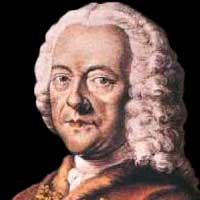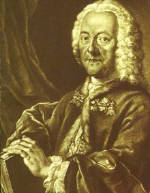Georg Philipp Telemann Biography - A Very Quick Guide
Georg Philipp Telemann (March 14, 1681–June 25, 1767) was a German Baroque music composer, born in Magdeburg. Self-taught in music, he studied languages and science at the University of Leipzig. He is credited as the most prolific composer of all time and was a contemporary of Johann Sebastian Bach. Nowadays Bach is generally thought of as the greater composer, though Telemann was better recognized for his musical abilities during his lifetime.
Telemann was so prolific that he was never able to count the number of his compositions. He traveled widely, absorbing various musical styles and incorporating them into his own compositions.
Telemann is known for writing concertos for abnormal combinations of instruments, such as multiple violas or trumpets.
He held a series of important musical positions, culminating in that of music director of the five largest churches in Hamburg, from 1720 until his death in 1767. He was succeeded by his godson Carl Philipp Emanuel Bach.
Compositions
- Der Geduldige Socrates (1721)
- Der Schulmeister
- Der Tod Jesu ('The death of Jesus')
- Die Donner-Ode ('The Ode of Thunder')
- Die Tageszeiten ('The Times of the Day')
- Der Tag des Gerichts ('The Day of Judgement')
Recordings
- Trauer — Actus, Cantatas Konrad Junghänel, 2002
Top Pieces on 8notes by Georg Philipp Telemann
Menuett
Gigue in G
Sonata TWV 41:f1, 1. Triste
Sonata TWV 41:f1, 3. Andante
Les Plaisirs (2nd Movement from Suite in A Minor)
Les Plaisirs (2nd Movement from Suite in A Minor) (Flute & Strings)
Viola Concerto 2nd Movement, TWV 51
Viola Concerto 1st Movement (Konzert fur Viola, Streicher und Basso continuo)

